Spring 2019 Friday, April 12 12:00 p.m. 4207 Helen C. White Hall Preserving Underground Performance: Expanding access to the record of 1970s-era experimental theatre Dr. Rachel Mattson, Curator of the Tretter Collection in GLBT Studies, University of Minnesota Jesse Hocking, Digital Project Archivist, Wisconsin Center for Film and Theater Research Funded by the National Historical Publications and Records Commission, WCFTR and the the La MaMa Experimental Theatre Club are digitizing, preserving, and promoting video documentation of La MaMa’s 1970s stage performances. La MaMa is often cited as the originator of Manhattan’s Off-Off-Broadway theater movement and was home to queer, Black, Asian American, and Latinx theater forms, as well as experimental theater practices of various kinds. Speakers will talk about the significance of the La MaMa footage, the complications of the medium, and the long-term preservation and access plan. Dr. Mattson was previously the archivist at La MaMa and wrote the NHPRC grant that allowed for the partnership with WCFTR. Monday, April 15 4:00 p.m. Curti Lounge, 5243 Mosse Humanities Building Newsprint Metropolis: City Papers and the Making of Modern Americans Julia Guarneri, University of Cambridge Julia Guarneri’s recent book Newsprint Metropolis offers a tour of American newspapers in their most creative and vital decades, around turn of the twentieth century. This history looks beyond newspapers’ front pages to much-loved features such as the sports page, the metropolitan section, the Sunday magazine, and the comic strips. The book shows that newspapers did not just report on cities, but truly helped to build them by hosting marketplaces, waging civic campaigns, and teaching readers new urban habits. In other words: cities made newspapers, but newspapers also made cities. Around the turn of the century, syndicates began to sell the same news articles, features, and illustrations to hundreds of different newspapers around the country. Meanwhile publishers like William Randolph Hearst and E.W. Scripps bought up multiple papers and formed chains, which shared reports and features among themselves. This talk will spotlight research from the Wisconsin Historical Society’s holdings, and use Milwaukee’s newspaper history to assess the impact of standardized news on city life and local culture. Julia Guarneri is a University Lecturer in American history at the University of Cambridge in the UK. She was a recipient of the 2010 James P. Danky Fellowship.  Friday, May 3 12:00 p.m. 4207 Helen C. White Hall James P. Danky Fellowship Lecture Be Sisters with Us: Midwestern Nuns, Environmental Justice, and the United Farm Worker Boycott, 1950-1975 John Buchkoski, University of Oklahoma Co-sponsored by the Wisconsin Historical Society This presentation examines the role that Midwestern nuns and Catholic laywomen had in promoting social and environmental justice for farmworkers in California. During the 1960s and 1970s, César Chávez and the United Farm Workers (UFW) movement encouraged Catholic women to participate in their labor struggle against corporate farmers. During a period in which religious women felt isolated from the Catholic hierarchy, they unionized under the National Assembly of Women Religious (NAWR) and found their calling in the UFW protests. They used their authority as school teachers and hospital administrators to promote the platforms of the UFW. In schools, they taught children about the dangers of pesticides and in hospitals, they convinced administrations to boycott nonunion affiliated fruits. Catholic sisters spread the UFW’s protest against pesticides to fruit’s biggest consumer base – housewives. Together, housewives and women religious played a pivotal role in assisting the UFW boycott in the Midwest. This presentation also examines the work that Christian laywomen had conducted for migrant workers’ rights. In one case study, during the 1950s and 1960s women-led religious organizations in Wisconsin provided social services for migrant laborers as a way to ensure that they had satisfied workers who would return each summer. The women’s groups focused on nutrition, hygiene, and education to help out these Latino families who did not have many opportunities. As a result, many of these Catholic sisters who promoted environmental justice found a supportive community that was ready to assist in the UFW’s causes. John Buchkoski is a PhD candidate in History at the University of Oklahoma and recipient of the 2018 James P. Danky Fellowship. The Danky Fellowship is co-sponsored by the Wisconsin Historical Society and the Center for the History of Print and Digital Culture.
Friday, May 3 12:00 p.m. 4207 Helen C. White Hall James P. Danky Fellowship Lecture Be Sisters with Us: Midwestern Nuns, Environmental Justice, and the United Farm Worker Boycott, 1950-1975 John Buchkoski, University of Oklahoma Co-sponsored by the Wisconsin Historical Society This presentation examines the role that Midwestern nuns and Catholic laywomen had in promoting social and environmental justice for farmworkers in California. During the 1960s and 1970s, César Chávez and the United Farm Workers (UFW) movement encouraged Catholic women to participate in their labor struggle against corporate farmers. During a period in which religious women felt isolated from the Catholic hierarchy, they unionized under the National Assembly of Women Religious (NAWR) and found their calling in the UFW protests. They used their authority as school teachers and hospital administrators to promote the platforms of the UFW. In schools, they taught children about the dangers of pesticides and in hospitals, they convinced administrations to boycott nonunion affiliated fruits. Catholic sisters spread the UFW’s protest against pesticides to fruit’s biggest consumer base – housewives. Together, housewives and women religious played a pivotal role in assisting the UFW boycott in the Midwest. This presentation also examines the work that Christian laywomen had conducted for migrant workers’ rights. In one case study, during the 1950s and 1960s women-led religious organizations in Wisconsin provided social services for migrant laborers as a way to ensure that they had satisfied workers who would return each summer. The women’s groups focused on nutrition, hygiene, and education to help out these Latino families who did not have many opportunities. As a result, many of these Catholic sisters who promoted environmental justice found a supportive community that was ready to assist in the UFW’s causes. John Buchkoski is a PhD candidate in History at the University of Oklahoma and recipient of the 2018 James P. Danky Fellowship. The Danky Fellowship is co-sponsored by the Wisconsin Historical Society and the Center for the History of Print and Digital Culture.
Fall 2018 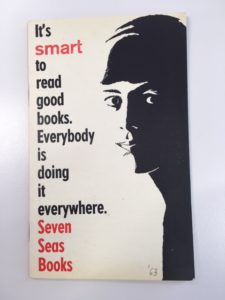 Friday, November 16 12:00 p.m. 4207 Helen C. White Hall 2018 James P. Danky Fellowship Lecture Red Ink: How Gertrude Gelbin Came to Publish English Books Behind the Iron Curtain Dr. Michele K. Troy, University of Hartford Co-sponsored by the Wisconsin Historical Society Come get a taste for Seven Seas Books and feisty American socialist, Gertrude Gelbin, who left the U.S. in the early 1950s to publish English-language paperbacks behind the Iron Curtain. From the heart of East Berlin, her Seven Seas Books sold its titles, some banned in the West, in bookstores and kiosks from Hanoi to London. Born in a coal-mining town in Pennsylvania, Gelbin had worked for MGM, and written under the pseudonym Valerie Stone, before heading to Chicago, where she met and married Stefan Heym, a German-Jewish refugee of Hitler’s regime who had fought for the U.S. in the war. Appalled by the methods of the House Un-American Activities Committee and U.S. involvement in Korea, Gelbin and Heym moved to East Berlin in protest in 1953. Gelbin remains little known, apart from her marriage to Heym – who became a famous East German dissident author – yet her press became a conduit for Anglo-American literature across the borders of the Cold War world, the meaning of her selection of books-in-exile altered by the very context in which she reprinted them. Her life and work merits attention because it does not conform to the Cold War dichotomy of freedom-loving West and autocratic East; rather her story and that of her publishing house are both historically counterintuitive and illuminating. They reveal not only how ideas circulate in authoritarian regimes, whether coopted, suppressed, or camouflaged; they also provoke us to think about the movement of people, and of the ideas they carry across borders, sometimes to the unlikeliest places, leaving traces, changing form, as they travel. Please note: this talk, funded by the James P. Danky Fellowship, will include discussion of the correspondence between Gelbin and “Hollywood Ten” author, Alvah Bessie, housed at the Wisconsin Historical Society. Dr. Michele K. Troy is a professor of English at the University of Hartford and recipient of the 2018 James P. Danky Fellowship. The Danky Fellowship is co-sponsored by the Wisconsin Historical Society and the Center for the History of Print and Digital Culture.
Friday, November 16 12:00 p.m. 4207 Helen C. White Hall 2018 James P. Danky Fellowship Lecture Red Ink: How Gertrude Gelbin Came to Publish English Books Behind the Iron Curtain Dr. Michele K. Troy, University of Hartford Co-sponsored by the Wisconsin Historical Society Come get a taste for Seven Seas Books and feisty American socialist, Gertrude Gelbin, who left the U.S. in the early 1950s to publish English-language paperbacks behind the Iron Curtain. From the heart of East Berlin, her Seven Seas Books sold its titles, some banned in the West, in bookstores and kiosks from Hanoi to London. Born in a coal-mining town in Pennsylvania, Gelbin had worked for MGM, and written under the pseudonym Valerie Stone, before heading to Chicago, where she met and married Stefan Heym, a German-Jewish refugee of Hitler’s regime who had fought for the U.S. in the war. Appalled by the methods of the House Un-American Activities Committee and U.S. involvement in Korea, Gelbin and Heym moved to East Berlin in protest in 1953. Gelbin remains little known, apart from her marriage to Heym – who became a famous East German dissident author – yet her press became a conduit for Anglo-American literature across the borders of the Cold War world, the meaning of her selection of books-in-exile altered by the very context in which she reprinted them. Her life and work merits attention because it does not conform to the Cold War dichotomy of freedom-loving West and autocratic East; rather her story and that of her publishing house are both historically counterintuitive and illuminating. They reveal not only how ideas circulate in authoritarian regimes, whether coopted, suppressed, or camouflaged; they also provoke us to think about the movement of people, and of the ideas they carry across borders, sometimes to the unlikeliest places, leaving traces, changing form, as they travel. Please note: this talk, funded by the James P. Danky Fellowship, will include discussion of the correspondence between Gelbin and “Hollywood Ten” author, Alvah Bessie, housed at the Wisconsin Historical Society. Dr. Michele K. Troy is a professor of English at the University of Hartford and recipient of the 2018 James P. Danky Fellowship. The Danky Fellowship is co-sponsored by the Wisconsin Historical Society and the Center for the History of Print and Digital Culture.  Friday, September 21 12:00 p.m. 4207 Helen C. White Hall Politics is Everybody’s Business: Resurrecting Faye Emerson, America’s Forgotten First Lady of Television Watch the recording Before the likes of Jimmy Kimmel, Johnny Carson, Steve Allen and Jack Paar, there was Faye Emerson, one of America’s original TV personalities from broadcast’s nascent years hosting CBS’s 15 minute, 3 nights-a-week late night talk show, The Faye Emerson Show (1950-1953). While largely forgotten today, Faye Emerson once dominated the media conversation as “The First Lady of Television” with her informed and engaging on-air, political dialogue concerning the hot topic issues of her day including war with North Korea, nuclear arms and equality for women. This presentation utilizes Emerson’s rich archival collection at the Wisconsin Center for Film and Theater Research which consists of seven cartons of clippings and personal files, plus nearly 3000 photos, recordings and show kinescopes, which Emerson herself ensured were recorded and preserved. In the preservation, revival and historical mining of Emerson’s archives including the repair and digital preservation of key kinescopes, Amy Sloper and Maureen Mauk reinvigorate the radical contributions of ‘Television’s First Lady’ and the impact of The Faye Emerson Show’s socially responsible on-air discourse and audience viewer interaction, the imprint of which remains in late-night television today. Amy Sloper is the Film Archivist at the Wisconsin Center for Film and Theater Research in Madison, Wisconsin. Her work involves managing the preservation, cataloging, and access to a diverse collection of over 30,000 moving images on film and video ranging from the collections of Hollywood Studios, directors, actors, writers, and producers; the works of independent and documentary filmmakers; and regional collections of home movies, government films, and industrial films. In addition, she teaches courses related to archiving and advises graduate students in the UW-Madison Information School. Maureen Mauk is a PhD student in the Communication department at University of Wisconsin- Madison focusing on Media & Cultural Studies. She carries a decade of experience serving in Los Angeles as a Television Standards & Practices executive and environmental activist. Her research interests include the study of women’s television history, media policy and parental effects surrounding children’s content in the digital space and and the use of social media for social and environmental betterment, particularly by mothers. Spring 2018
Friday, September 21 12:00 p.m. 4207 Helen C. White Hall Politics is Everybody’s Business: Resurrecting Faye Emerson, America’s Forgotten First Lady of Television Watch the recording Before the likes of Jimmy Kimmel, Johnny Carson, Steve Allen and Jack Paar, there was Faye Emerson, one of America’s original TV personalities from broadcast’s nascent years hosting CBS’s 15 minute, 3 nights-a-week late night talk show, The Faye Emerson Show (1950-1953). While largely forgotten today, Faye Emerson once dominated the media conversation as “The First Lady of Television” with her informed and engaging on-air, political dialogue concerning the hot topic issues of her day including war with North Korea, nuclear arms and equality for women. This presentation utilizes Emerson’s rich archival collection at the Wisconsin Center for Film and Theater Research which consists of seven cartons of clippings and personal files, plus nearly 3000 photos, recordings and show kinescopes, which Emerson herself ensured were recorded and preserved. In the preservation, revival and historical mining of Emerson’s archives including the repair and digital preservation of key kinescopes, Amy Sloper and Maureen Mauk reinvigorate the radical contributions of ‘Television’s First Lady’ and the impact of The Faye Emerson Show’s socially responsible on-air discourse and audience viewer interaction, the imprint of which remains in late-night television today. Amy Sloper is the Film Archivist at the Wisconsin Center for Film and Theater Research in Madison, Wisconsin. Her work involves managing the preservation, cataloging, and access to a diverse collection of over 30,000 moving images on film and video ranging from the collections of Hollywood Studios, directors, actors, writers, and producers; the works of independent and documentary filmmakers; and regional collections of home movies, government films, and industrial films. In addition, she teaches courses related to archiving and advises graduate students in the UW-Madison Information School. Maureen Mauk is a PhD student in the Communication department at University of Wisconsin- Madison focusing on Media & Cultural Studies. She carries a decade of experience serving in Los Angeles as a Television Standards & Practices executive and environmental activist. Her research interests include the study of women’s television history, media policy and parental effects surrounding children’s content in the digital space and and the use of social media for social and environmental betterment, particularly by mothers. Spring 2018  The Center for the History of Print and Digital Culture is pleased to announce the official release of Digital Mappa, a new digital humanities resource for the easy creation of research workspaces, editions, scholarship, collaboration and open access publications. To learn more, go to the Digital Mappa Announcement or digitalmappa.org.
The Center for the History of Print and Digital Culture is pleased to announce the official release of Digital Mappa, a new digital humanities resource for the easy creation of research workspaces, editions, scholarship, collaboration and open access publications. To learn more, go to the Digital Mappa Announcement or digitalmappa.org.  James P. Danky Fellowship Applications now open! Due May 1, 2018. For more details go to the James P. Danky Fellowship webpage.
James P. Danky Fellowship Applications now open! Due May 1, 2018. For more details go to the James P. Danky Fellowship webpage. 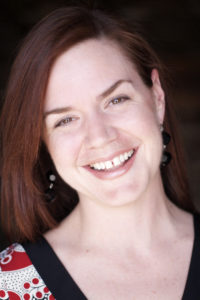 Thursday, April 12 12:00 p.m. 4191F Helen C. White Hall (inside the Information School Library) Reading, Writing, and Racism: Ralph Ellison’s Invisible Man and African American Literacy in Cold War America Kristin Matthews, Associate Professor of English, Brigham Young University
Thursday, April 12 12:00 p.m. 4191F Helen C. White Hall (inside the Information School Library) Reading, Writing, and Racism: Ralph Ellison’s Invisible Man and African American Literacy in Cold War America Kristin Matthews, Associate Professor of English, Brigham Young University
African Americans have a unique relationship with literacy. Long denied by slavery and long seen as the path to freedom, literacy after WWII bore different implications for African Americans still bearing the weight of racial prejudice. In this presentation, Kristin Matthews will discuss the ways in which African American educators, activists, and writers began to question the politics and ideology undergirding reading initiatives post-WWII and contested the ways in which those initiatives maintained a racial status quo. Specifically, she will discuss how Ralph Ellison’s award winning novel, Invisible Man, explores the relationship between reading and power, demonstrating how such power might be used to liberate or control and offering a mode of reading that allows for imagination and self-determination in Cold War America.
Fall 2017 Colloquia Schedule Multispectral Imaging Coming to the University of Wisconsin Multispectral Imaging Lecture and Demonstration 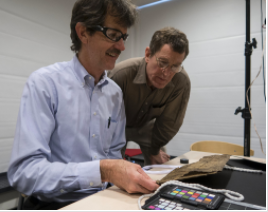 Mike Toth, R. B. Toth and Associates Wednesday December 13th 10:00-11:30 am Memorial Library, Special Collections Seminar Room, 9th Floor 2017 Danky Fellowship Lecture – Joshua Mitchell Monday, November 13 12:00 p.m. 4207 Helen C. White Hall Watch the recording
Mike Toth, R. B. Toth and Associates Wednesday December 13th 10:00-11:30 am Memorial Library, Special Collections Seminar Room, 9th Floor 2017 Danky Fellowship Lecture – Joshua Mitchell Monday, November 13 12:00 p.m. 4207 Helen C. White Hall Watch the recording 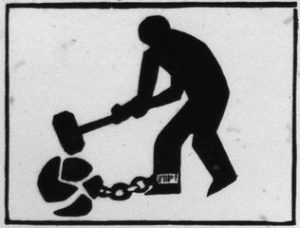 Print Culture in Prisons: Promoting Entertainment in the Penal Press Joshua Mitchell, University of Southern California In the mid-20th century, state and federal prisons across the United States and Canada allocated funds to publish newspapers and magazines for an imprisoned readership in monthly or weekly installments. Hundreds of imprisoned journalists organized under a loosely associated network called the Penal Press, and traded their publications by mail to institutions across the continent. This talk examines the visual strategies used by imprisoned journalists to advertise upcoming film screenings and other entertainment activities at their respective institutions. Through the archive of the Penal Press, we learn that imprisoned spectators possessed shrewd evaluations of the moving images presented to them, and used movie screenings as occasions to critique the institutional settings in which they lived. The talk will use examples of movie advertisements that appeared in a wide variety of Penal Press papers, including The Candle (Wisconsin State Prison), Ohio Penitentiary News (Ohio Penitentiary), Menard Time (Illinois State Penitentiary), and Rikers Review (New York City Penitentiary), all of which are part of the collection at Wisconsin Historical Society.
Print Culture in Prisons: Promoting Entertainment in the Penal Press Joshua Mitchell, University of Southern California In the mid-20th century, state and federal prisons across the United States and Canada allocated funds to publish newspapers and magazines for an imprisoned readership in monthly or weekly installments. Hundreds of imprisoned journalists organized under a loosely associated network called the Penal Press, and traded their publications by mail to institutions across the continent. This talk examines the visual strategies used by imprisoned journalists to advertise upcoming film screenings and other entertainment activities at their respective institutions. Through the archive of the Penal Press, we learn that imprisoned spectators possessed shrewd evaluations of the moving images presented to them, and used movie screenings as occasions to critique the institutional settings in which they lived. The talk will use examples of movie advertisements that appeared in a wide variety of Penal Press papers, including The Candle (Wisconsin State Prison), Ohio Penitentiary News (Ohio Penitentiary), Menard Time (Illinois State Penitentiary), and Rikers Review (New York City Penitentiary), all of which are part of the collection at Wisconsin Historical Society.
Spring 2017 Colloquia Schedule  The Shadow of Empty Shelves: World Literature and the National Socialist Pact with Books Dr. B. Venkat Mani Department of German, Nordic, and Slavic Friday, March 10 4 p.m. 4207 Helen C. White Hall Drawing on his recently published study, Recoding World Literature (2017), in this lecture, Mani focuses on the role of the state in the construction of world literature. Mani argues that investigations of library and print cultural histories assist in understanding the relationship between the “republic” and its “reading public.” The lecture will focus on the first half of the 20th century, presenting Nazi Germany as a case study, sharing archival finds that have made into the book.
The Shadow of Empty Shelves: World Literature and the National Socialist Pact with Books Dr. B. Venkat Mani Department of German, Nordic, and Slavic Friday, March 10 4 p.m. 4207 Helen C. White Hall Drawing on his recently published study, Recoding World Literature (2017), in this lecture, Mani focuses on the role of the state in the construction of world literature. Mani argues that investigations of library and print cultural histories assist in understanding the relationship between the “republic” and its “reading public.” The lecture will focus on the first half of the 20th century, presenting Nazi Germany as a case study, sharing archival finds that have made into the book.
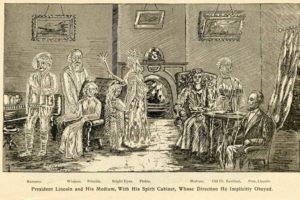
 Intuitive Historiography in the Archive Cheryl Spinner Duke University Thursday, April 6 12:00 p.m. 4207 Helen C. White Hall Over the course of this talk, Dr. Cheryl Spinner provides a model for what she calls “intuitive historiographic methods” as a way to approach the archives of the nineteenth-century spiritualist movement. The movement began in 1848 when two sisters in Rochester, NY claimed to hear messages from the spirit world through mysterious knockings that corresponded to Morse code. Spinner argues that the positivist bent of traditional historical analysis is not always useful when assessing whether or not spiritualist testimonies are reliable historical documents. Spinner draws on Jay Monaghan’s analysis of Nettie Colburn Maynard’s expose, Was Abraham Lincoln a Spiritualist? (1892), to show how intuitive historiography can help us approach these perplexing accounts when traditional empirical methods simply fail us. Maynard after all asserts Lincoln sought the spirit medium for political guidance and sat on a floating piano in the White House during a séance. Spinner then asks, “How do we navigate archival materials that insist on the seemingly impossible?” This talk will be of special interest to historians of Wisconsin given that the first spiritualist college, The Morris Pratt Institute, was founded in 1889 in Whitewater, WI. Whitewater was often called the “second Salem,” an analog to one of the east’s most witchy cities, and the Midwestern hub of spiritualist activity. Spinner draws on examples from the Wisconsin Historical Society’s archives on local spiritualists to demonstrate intuitive historiography in action.
Intuitive Historiography in the Archive Cheryl Spinner Duke University Thursday, April 6 12:00 p.m. 4207 Helen C. White Hall Over the course of this talk, Dr. Cheryl Spinner provides a model for what she calls “intuitive historiographic methods” as a way to approach the archives of the nineteenth-century spiritualist movement. The movement began in 1848 when two sisters in Rochester, NY claimed to hear messages from the spirit world through mysterious knockings that corresponded to Morse code. Spinner argues that the positivist bent of traditional historical analysis is not always useful when assessing whether or not spiritualist testimonies are reliable historical documents. Spinner draws on Jay Monaghan’s analysis of Nettie Colburn Maynard’s expose, Was Abraham Lincoln a Spiritualist? (1892), to show how intuitive historiography can help us approach these perplexing accounts when traditional empirical methods simply fail us. Maynard after all asserts Lincoln sought the spirit medium for political guidance and sat on a floating piano in the White House during a séance. Spinner then asks, “How do we navigate archival materials that insist on the seemingly impossible?” This talk will be of special interest to historians of Wisconsin given that the first spiritualist college, The Morris Pratt Institute, was founded in 1889 in Whitewater, WI. Whitewater was often called the “second Salem,” an analog to one of the east’s most witchy cities, and the Midwestern hub of spiritualist activity. Spinner draws on examples from the Wisconsin Historical Society’s archives on local spiritualists to demonstrate intuitive historiography in action.  From Document to Documentary: Engaging the Public in Digital Humanities with Video Katie Buehner Head of Rita Benton Music Library, University of Iowa Lecture – Monday, April 10 12:00 pm 4191 CAT LAB, Helen C. White Hall Workshop – Monday, April 10 1:15-2:30 College Library, Room 2257 From her experience producing over 100 successful online video series, including “If Books Could Talk,” Ms. Buehner will share her knowledge about creating exciting and accessible educational videos for public engagement in humanities scholarship. Her hands-on workshop will provide tips and tools, many of which appear in her forthcoming book A Music Librarian’s Guide to Creating Videos and Podcasts: Music Library Association Technical Reports (Middleton, WI: A-R Editions, 2017).
From Document to Documentary: Engaging the Public in Digital Humanities with Video Katie Buehner Head of Rita Benton Music Library, University of Iowa Lecture – Monday, April 10 12:00 pm 4191 CAT LAB, Helen C. White Hall Workshop – Monday, April 10 1:15-2:30 College Library, Room 2257 From her experience producing over 100 successful online video series, including “If Books Could Talk,” Ms. Buehner will share her knowledge about creating exciting and accessible educational videos for public engagement in humanities scholarship. Her hands-on workshop will provide tips and tools, many of which appear in her forthcoming book A Music Librarian’s Guide to Creating Videos and Podcasts: Music Library Association Technical Reports (Middleton, WI: A-R Editions, 2017).  From Documentary to Social Media: Engaging the Public in Digital Humanities with Social Media Colleen Theisen Outreach and Engagement Librarian, Special Collections, University of Iowa Lecture – Tuesday, April 11 12:00 pm Bunge Room 4207, Helen C. White Hall Workshop – Tuesday, April 11 1:15-2:30 College Library, Room 2257 As Outreach & Engagement Librarian at The University of Iowa Special Collections, Ms. Theisen has published on the culture of social media in New Directions for Special Collections: An Anthology of Practice and has presented papers at several conferences. Her lecture will address how and why to create an institutional/organizational social media identity for use in making collections accessible and engaging a wide public. Her hands-on workshop will discuss the tips and tools she uses for promoting humanities research projects to both academic and public audiences online.
From Documentary to Social Media: Engaging the Public in Digital Humanities with Social Media Colleen Theisen Outreach and Engagement Librarian, Special Collections, University of Iowa Lecture – Tuesday, April 11 12:00 pm Bunge Room 4207, Helen C. White Hall Workshop – Tuesday, April 11 1:15-2:30 College Library, Room 2257 As Outreach & Engagement Librarian at The University of Iowa Special Collections, Ms. Theisen has published on the culture of social media in New Directions for Special Collections: An Anthology of Practice and has presented papers at several conferences. Her lecture will address how and why to create an institutional/organizational social media identity for use in making collections accessible and engaging a wide public. Her hands-on workshop will discuss the tips and tools she uses for promoting humanities research projects to both academic and public audiences online.
Fall 2016 Evening to Honor James Baughman Thursday, October 27 5-8 p.m. Wisconsin Historical Society Please save the date for an evening honoring Jim Baughman’s personal and professional legacy, including his significant intellectual contributions to American history. The event is currently being planned and will feature a tribute to Jim’s scholarship by media historian David Nord, as well as a panel of former undergraduate and graduate students. 25th Anniversary Symposium Thursday, November 10, 4 p.m. Memorial Library, Room 126 Join the Center for the History of Print and Digital Culture to celebrate 25 years of scholarship Featuring
- John Cole, Library of Congress Historian
- Wayne Wiegand, Historian and Co-Founder, Center for the History of Print and Digital Culture
- James P. Danky, Historian and Co-Founder, Center for the History of Print and Digital Culture
Brownbag Talk Thursday, November 10 Noon 4246 HC White Hall (SLIS Conference Room) All the Facts: A History of Information in the United States since 1870 Jim Cortada University of Minnesota
Spring 2016 “Gender and Big Data: Finding or Making Stereotypes?” CHPDC Annual Lecture 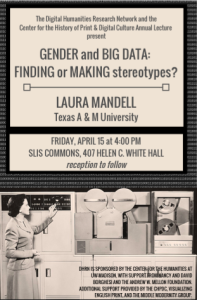 Laura Mandell Professor of English and Director of the Initiative for Digital Humanities, Media, and Culture, Texas A&M University Friday, April 15 at 4:00 p.m. Bunge Room, 4207 Helen C. White Hall Reception with light refreshments to follow. In his book Macroanalysis, Matthew Jockers argues that we have reached a “tipping point.” Now that we have so much digital data, we can use techniques and methodologies used to explore big data: text mining, topic modeling, machine learning, named entity recognition, etc. Two problems confront digital literary historians of women writers who wish to apply these methodologies. First, the number of women writers who published works before 1800 in Britain and America, as well as the number of their publications that have been preserved, is small compared to men, a problem compounded by how few works by early modern women writers are currently being digitized: roughly 4% of 307,000 volumes in the Early English Books Online and Eighteenth-Century Collections Online were written by women writers. Second, many of the data analysts currently comparing what they call “female writing” to “male writing” propagate rather than interrogate stereotypes about women and women writers. Sociologists have worked on such problems, and in this talk, I will outline some of their strategies and discuss how literary critics who wish to perform macroanalysis might make use of them. Data scientists in the commercial world have worked on the problem of representing minorities “fairly” even when they are represented by a small sample. Thanks to the robust history of feminist theory and criticism, we have the means for generating vocabularies, taxonomies, and ontologies for semantic searching and supervised topic modeling that differ from those generated through big-data techniques that naïvely privilege historically oppressive discourses. Second, the need to shift from quantitative to qualitative analysis (and back again) is augmented when analyzing textual data produced by minorities. I argue that, once again, the concern for social justice enhances intellectual work by effectively demonstrating the inadequacies of claiming “new” discoveries based upon “statistical significance” alone. DHRN is a part of the Borghesi-Mellon Interdisciplinary Workshops in the Humanities, sponsored by the Center for the Humanities at the University of Wisconsin-Madison, with support from Nancy and David Borghesi and the Andrew W. Mellon Foundation.
Laura Mandell Professor of English and Director of the Initiative for Digital Humanities, Media, and Culture, Texas A&M University Friday, April 15 at 4:00 p.m. Bunge Room, 4207 Helen C. White Hall Reception with light refreshments to follow. In his book Macroanalysis, Matthew Jockers argues that we have reached a “tipping point.” Now that we have so much digital data, we can use techniques and methodologies used to explore big data: text mining, topic modeling, machine learning, named entity recognition, etc. Two problems confront digital literary historians of women writers who wish to apply these methodologies. First, the number of women writers who published works before 1800 in Britain and America, as well as the number of their publications that have been preserved, is small compared to men, a problem compounded by how few works by early modern women writers are currently being digitized: roughly 4% of 307,000 volumes in the Early English Books Online and Eighteenth-Century Collections Online were written by women writers. Second, many of the data analysts currently comparing what they call “female writing” to “male writing” propagate rather than interrogate stereotypes about women and women writers. Sociologists have worked on such problems, and in this talk, I will outline some of their strategies and discuss how literary critics who wish to perform macroanalysis might make use of them. Data scientists in the commercial world have worked on the problem of representing minorities “fairly” even when they are represented by a small sample. Thanks to the robust history of feminist theory and criticism, we have the means for generating vocabularies, taxonomies, and ontologies for semantic searching and supervised topic modeling that differ from those generated through big-data techniques that naïvely privilege historically oppressive discourses. Second, the need to shift from quantitative to qualitative analysis (and back again) is augmented when analyzing textual data produced by minorities. I argue that, once again, the concern for social justice enhances intellectual work by effectively demonstrating the inadequacies of claiming “new” discoveries based upon “statistical significance” alone. DHRN is a part of the Borghesi-Mellon Interdisciplinary Workshops in the Humanities, sponsored by the Center for the Humanities at the University of Wisconsin-Madison, with support from Nancy and David Borghesi and the Andrew W. Mellon Foundation. 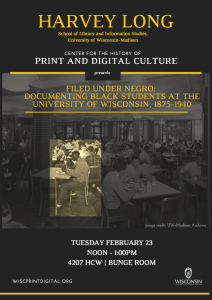 Filed Under Negro: Documenting Black Students at the University of Wisconsin, 1875-1940. Harvey Long University of Wisconsin-Madison Tuesday February 23, 12pm, Bunge Room, 4207 HCW SLIS MA student, Harvey Long discusses his research on race and university archives via the process of searching for and discovering the records of students of color at the University of Wisconsin before 1940. The Memory Exchange: Public Mourning at the National 9/11 Memorial Museum Sarah Senk University of Hartford Thursday, March 10, 12 p.m., 4th floor Helen C. White Hall (4191F – SLIS Library)
Filed Under Negro: Documenting Black Students at the University of Wisconsin, 1875-1940. Harvey Long University of Wisconsin-Madison Tuesday February 23, 12pm, Bunge Room, 4207 HCW SLIS MA student, Harvey Long discusses his research on race and university archives via the process of searching for and discovering the records of students of color at the University of Wisconsin before 1940. The Memory Exchange: Public Mourning at the National 9/11 Memorial Museum Sarah Senk University of Hartford Thursday, March 10, 12 p.m., 4th floor Helen C. White Hall (4191F – SLIS Library) 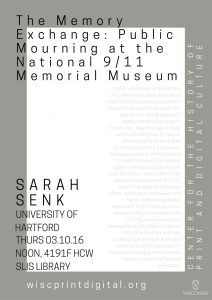 Implicit in the design of the National 9/11 Memorial Museum is the notion that its commemorative space affirms a pluralist collective of individuals who, despite their varying degrees of spatial or temporal proximity to “Ground Zero,” are encouraged to bear witness here and now. By radically broadening the notion of what constitutes a witness, the museum displaces a sense of unified historical time with the time of the individual subject, implying to visitors that the time that matters most is that of their own personal experience of “9/11,” even if that experience happens fifteen years later in the museum, and has no firsthand experiential antecedent. In this lecture, I examine how the museum produces an ostensibly all-inclusive notion of witness – a configuration whose inclusivity belies the ways in which it is premised upon the replication of the self-identical. If the traditional archive represents the past in isolation, the 9/11 Museum gestures to a fundamental re-articulation of what we think of as the there and then, constituting a new form of personal memory that is no longer based on proximal witnessing, but nevertheless comes to constitute historical knowledge.
Implicit in the design of the National 9/11 Memorial Museum is the notion that its commemorative space affirms a pluralist collective of individuals who, despite their varying degrees of spatial or temporal proximity to “Ground Zero,” are encouraged to bear witness here and now. By radically broadening the notion of what constitutes a witness, the museum displaces a sense of unified historical time with the time of the individual subject, implying to visitors that the time that matters most is that of their own personal experience of “9/11,” even if that experience happens fifteen years later in the museum, and has no firsthand experiential antecedent. In this lecture, I examine how the museum produces an ostensibly all-inclusive notion of witness – a configuration whose inclusivity belies the ways in which it is premised upon the replication of the self-identical. If the traditional archive represents the past in isolation, the 9/11 Museum gestures to a fundamental re-articulation of what we think of as the there and then, constituting a new form of personal memory that is no longer based on proximal witnessing, but nevertheless comes to constitute historical knowledge.